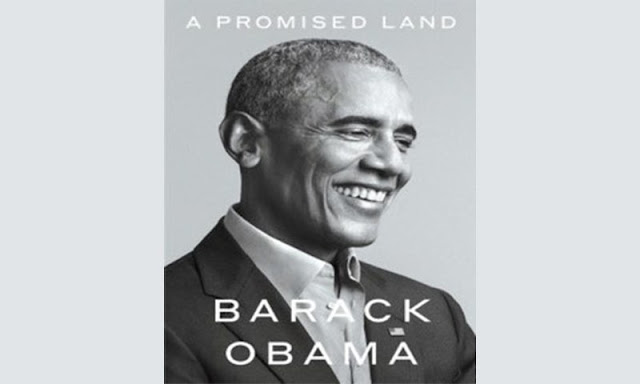zaviews on Barack Obama "A Promised Land"
Former US President Barack Obama published his memoirs in book form in 1995 entitled 'Dreams from My Father'. He was known at the time as a determined Chicago politician, and in the book he took seriously the need to counter the "dual sense of individual progress and collective decline" in the United States.
He made this decision because of his personal losses, racial discrimination and emigration. And now, after a few decades and two terms in office, Obama has revisited his journey as a successful politician. This time, he is preparing to speak on a topic of nation's rise and fall inside and outside US borders that most people shy away from.
A Promised Land is the first book in a two-book series. The book contains memoirs of Obama as the 44th President of the United States (2009-2017).
These memoirs, written with admirable foresight, focus on the evolution of identity politics in the United States, as well as the extent of US influence in military intervention, counterterrorism, and diplomatic power games.
In the book, Obama also mentions the role of his wife Mashaal and his harmony with her. He portrayed an America where the future of political leadership changes all the time.
'Dual attitude' of US foreign policy
In the first half of the book, Obama discusses in depth the politics of identity in US foreign policy, large-scale military interventions, and the need for coordination with the country's national security leadership.
"The son of a black African with a Muslim name and socialist ideology and who commands the entire US administration was a situation he (US citizens) always wanted to avoid," Obama wrote, referring to his presidency'.
Obama says US policies in many Asian and Latin American countries have given rise to oppressive military dictators. Obama has called it a "double standard" in US foreign policy and believes that US electoral realities need to be recognized in order to address the issue.
Obama acknowledged that during his presidency, his supporters used the double standard of US foreign policy as an argument for "strengthening foreign policy," while his opponents saw it as Obama's weakness. Doubted patriotism.
The reality behind Obama's cautious view came in the wake of the violent protests that followed Biden's 46th presidency. In the wake of tensions on Capitol Hill in January this year, Biden has sought to differentiate between the constitutional freedom of expression and the rebels' violent resistance to the US electoral system.
The gist of Obama and Biden's liberal experience is that as long as the internal roles of peaceful coexistence in the United States are not harmonized, foreign skepticism about American "influence" will remain.
Military intervention in Afghanistan
With regard to military intervention, especially in Afghanistan, Obama believes that the focus should be on reducing the threat of militancy, even if it means keeping an eye on al Qaeda.
"Although the Taliban's intentions were limited to Afghanistan, their leadership was in contact with al-Qaeda," Obama warned. With the return of the Taliban to power, there is a danger that Afghanistan will again become a hotbed of attacks on the United States and its allies.
In today's situation, this observation also seems to be correct. The effects of al-Qaeda's influence on various Taliban groups later influenced the peaceful attitude adopted by the Taliban. In addition, many of its fighters are still interested in attacks on US forces in Afghanistan.
Obama's focus on "eliminating al Qaeda" and his insistence on it signals a shift in current US foreign policy towards Kabul, or even a proposal. Because of the Trump administration's behavior, the United States has not realized that al-Qaeda is in talks with Taliban groups. Thus, a superpower could not sever ties between the Taliban and al-Qaeda fighters due to a lack of scrutiny.
However, Obama's hunger for risk mitigation seems to be fading on the diplomatic front. These fronts include the ongoing diplomatic tensions with China and the issue of alliance with Israel.
Free trade with China
Referring to China, Obama writes, "I have never supported a statement against free trade. I think we can never stop globalization completely. " He also wrote that he considered lifting millions of people out of extreme poverty a major "human achievement" in China.
But Obama's words are that his views on China have not been well received in US political circles. He cited a strong threat from Washington, which calculates that the United States will have to pay the price for China's rise on the world stage.
The Obama administration has resorted to every tactic to avoid an open confrontation with China. Thus, it was surprising that Obama went beyond "ideological boundaries" and stayed away from possible partnership opportunities. This kind of mistake for the world's most fruitful bilateral relationship comes in the form of steps taken by Trump that have devastating consequences.
US-Israel relations
Speaking of Israel, Obama has little hope for a two-state solution to the Israeli-Palestinian conflict. He mentions September 2000, when a popular Israeli politician (and later prime minister) made "a provocative visit to Jerusalem in Jerusalem," a place of special significance to Muslims. The purpose of the visit was to achieve electoral goals and to declare Israel's occupation of a large area. Obama reminded that "Israel's attitude towards peace talks was very strict."
This is an important political reminder. Israeli Prime Minister Benjamin Netanyahu is talking about building new settlements in the occupied West Bank to win the March election again. On the other hand, he has persuaded the Arab powers to remain silent on the Palestinian issue.
Obama has also hinted that US peace efforts in the Biden administration will not do much good. Like his successor, Obama has defended Israel, saying that the UN General Assembly has, over time, become a forum for "hypocrisy and unilateral condemnation of Israel." It was American officials who tried to keep the United Nations neutral against Israel and reduce Israel's broad-based opposition.
Strong emotional foundation
Remember that Obama is not only a capable politician but also a worthy writer and well-known orator who attributes his leadership abilities to a strong emotional foundation. This is evident in his friendship with his wife Mashal. Inside the Oval Office, Mashaal taught Obama the art of moving forward with 'heart instead of mind and experience instead of analysis'. This was the lesson of building consensus that Obama put into practice during his presidential trip to Congress.
Similarly, when Mashaal refused to be a symbol of the ongoing gender struggle in the United States, much to the dismay of the media, Obama learned how Mashaal maintains order in public life.
And finally, during his presidency, he realized that such an emotional basis was beneficial to him in politics. With a strong center, Obama easily developed the qualities of a national leader and successfully fought the opposition. He went beyond party politics and included people from other parties in his administration.
The Affordable Care Act, the Paris Agreement, the Iran Nuclear Agreement, and the constitutional measures to end gender discrimination were some of the successful policies of the Obama presidency. Reading this book, the reader realized the importance of personal relationships in the success of a president.
But when it comes to Obama's foreign policy and diplomatic approach, or national identity issues, the 700-page memo rarely answers.




Comments
Post a Comment